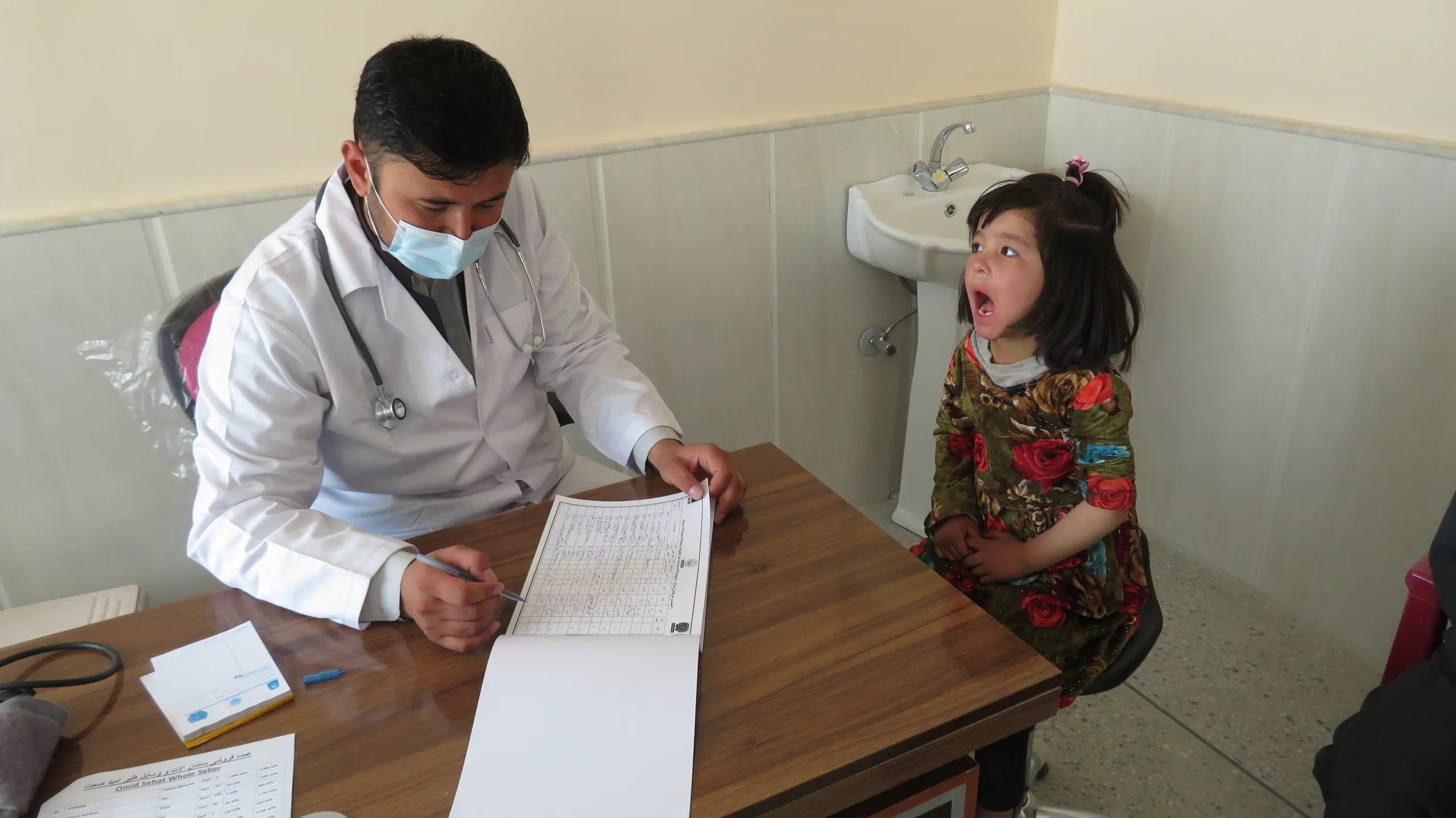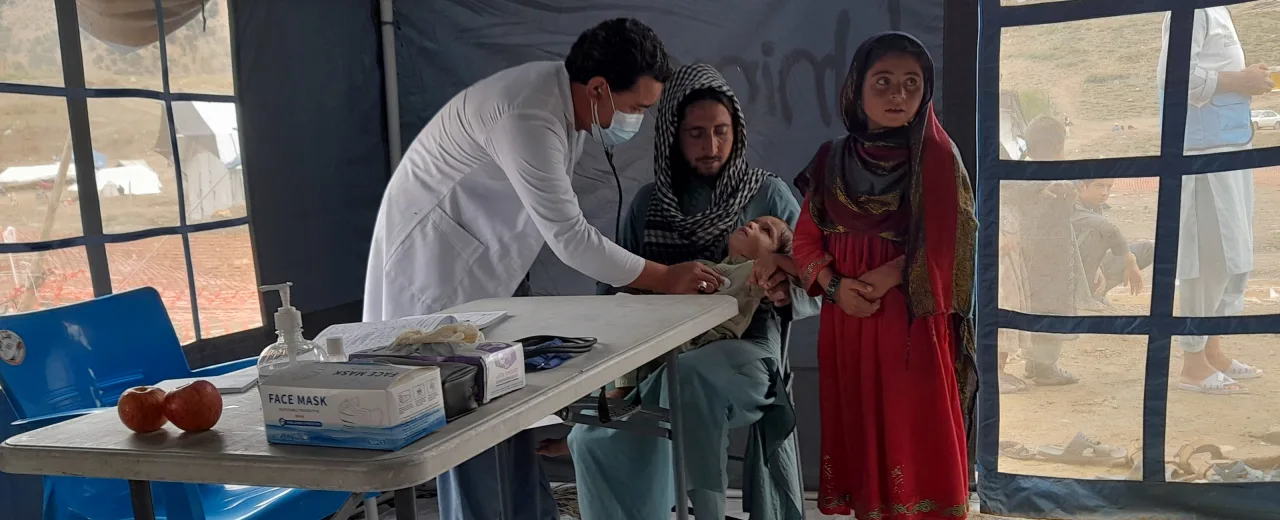 A healthy start to life
A healthy start to life
Primary health care for infants and pregnant women
If you suddenly fall ill, how far is it to the nearest doctor? In Afghanistan, parents usually have to walk for many hours with their children until they find medical help - and Nazifa is no exception. She has her little daughter Iman tied tightly to her back. She walks for twelve hours through snow and ice to the mother-and-child clinic in the village of Qulab. Even from a distance, Nazifa sees the smoke rising from the chimney and knows: hot tea, a stove and medical help for Iman are waiting here. Nazifa also wants to have herself examined. She is pregnant with her third child and cannot get any preventive care where she lives. After Iman's lungs are examined and the fever is finally brought down by the medical team, Nazifa has herself and her unborn baby examined: Everything is fine, only a little more nourishment is needed for mother and both children, who now leave for home relieved.
Necessity
Medical care for children and pregnant women in rural Afghanistan
Activity
Operation of 7 mother-child clinics in remote mountain regions in Kabul province to care for 100 infants and pregnant women per clinic every day
Countable effort
Number of preventive examinations, vaccination and nutritional screenings as well as treatments carried out for infants, newborns and pregnant women
Result
145,000 children, newborns and pregnant women are provided with long-term medical care and receive free vaccinations, supplementary food and treatment in case of illness
Systemic effect
Reduction of the currently extremely high mother-child mortality in rural Afghanistan; stabilisation of the nutritional and health status of children
Background
As early as 2021, after the Taliban took power in Afghanistan, the WHO feared that the health system in the country was on the verge of collapse (dpa 2021). Some clinics had to close even then (ibid.). Today, the situation looks even more difficult, especially in rural Afghanistan.It has become almost impossible, not only for Nazifa, but for many hundreds of thousands of families in the countryside, to find quick medical help in emergencies. At the same time, hunger reigns. According to a survey by the World Food Program, 92 percent of all families in Afghanistan say they are no longer able to feed their children adequately (World Food Program, Afghanistan,2023). Every second child shows signs of malnutrition or undernourishment (UNICEF 2023). Iman is also a bit too small for her age and much too thin. It’s good that the doctor in Qulab has packed her a month’s ration of restorative food. Every day she is to receive a small packet with the most important nutrients and building materials so that she can regain strength and grow. The project runs seven mother-child clinics like the one in Qulab in particularly remote regions of Kabul province. Every morning, up to a hundred mothers with children stand outside each clinic waiting for treatment. Each clinic employs a medical team of ten people. Half of them are women. This is because in rural Afghanistan, girls may only be treated by women and boys by men. The medical sector is therefore excluded from the country’s ban on women working. Midwife Zainab is very relieved about this. “There is so much to do here,” she says. Easily treatable diseases such as pneumonia, diarrhoea and pregnancy complications can quickly become life-threatening for mothers and children here in the country. Every hand is therefore urgently needed. The councils of elders in the surrounding villages, who support and protect the project clinic and its staff, also know this.
The good deed
The Good Deed targets a total of 145,000 infants, newborns or pregnant women who are in urgent need of medical support in rural Afghanistan. It provides preventive medical care in the midst of the mountains of Afghanistan. This includes preventive medical check-ups, free vaccinations, supplementary food in case of malnutrition or malnutrition and medical treatment in case of illness. Through this good deed, pregnant women receive pre- and post-pregnancy care and, if they wish, a medically assisted birth. In this way, this open door saves many small and large lives in Afghanistan.

About Afghanistan
Kabul
Capital
41,128,771
Number of inhabitants
363.7
Gross domestic product per capita per year
0,478
Human Development Index
When a child is born in Afghanistan, its eyes are decorated with kohl on the lower eyelid line just a few weeks after birth. This custom is widespread in the Middle East. The black pastel is supposed to protect the eyes from infections and the newborn from the evil eye of others - according to popular belief.
About the organization and further information
Association
Afghanischer Frauenverein e.V.
Website
http://www.afghanischer-frauenverein.de

Further information and source
- Médecins sans Frontiers, 6.2.2023: Persistent barriers to access healthcare in Afghanistan. An MFS report.
- SPIEGEL, 26.05.2022: In Afghanistan füllen hungernde Kinder die Krankenhäuser - und sterben dort. Laut UN werden in diesem Jahr Laut der Uno werden in diesem Jahr 1,1 Millionen Kinder unter fünf Jahren an schwerster Unterernährung leiden. Für viele kommt jede Hilfe zu spät.
- World Food Programme, 14.03.2023: Afghanistan Situation Report
- Afghanischer Frauenverein, 06.11.2022: Jahres- und Tätigkeitsbereicht.




